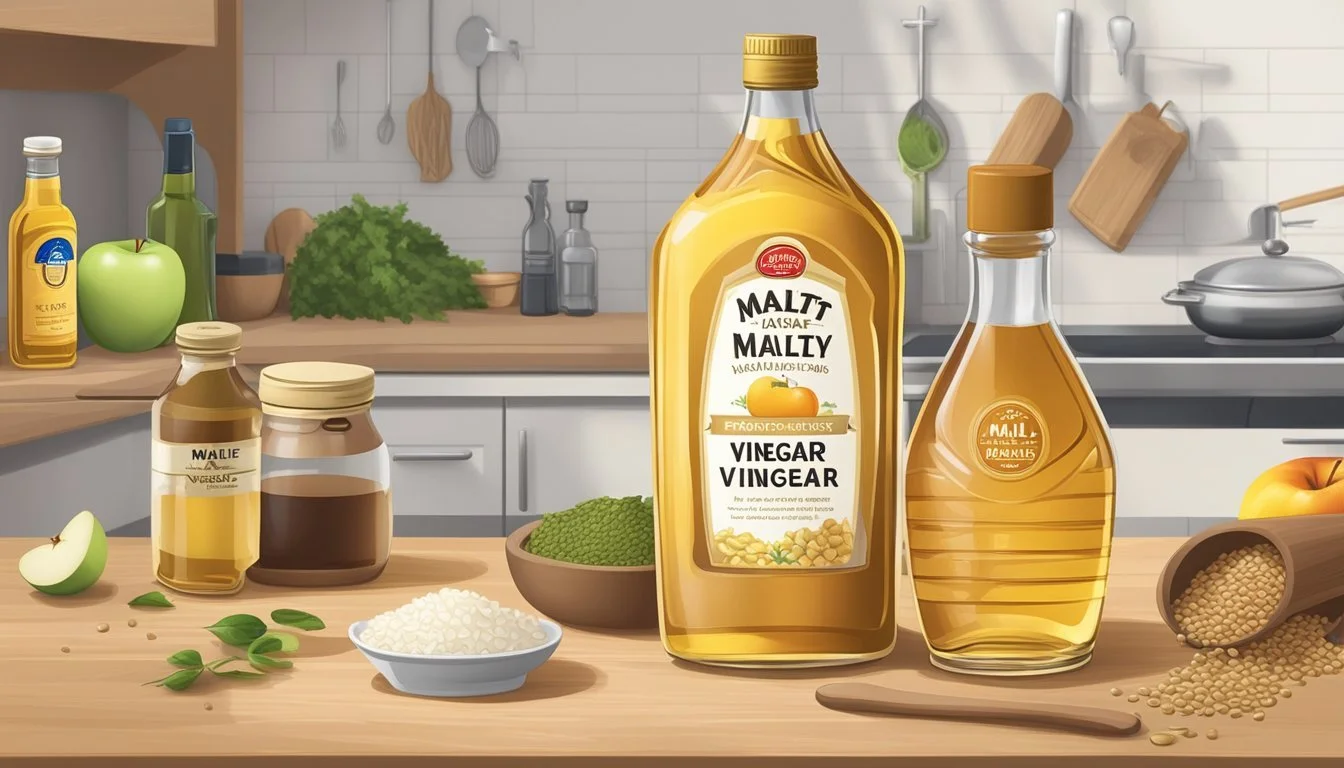Malt Vinegar Substitutes
Top Alternatives for Cooking and Dressings
Malt vinegar, a pantry staple known for its robust flavor with a nutty and toasty undercurrent, is a common ingredient used in a variety of dishes, ranging from classic fish and chips to salad dressings. It's created from malted barley, which is fermented into ale before being further fermented into vinegar. Its distinctive taste is due to the malting process, which involves soaking the barley grains to germinate, then drying and crushing them. However, not everyone may have malt vinegar at hand or may need to avoid it due to dietary restrictions.
Substituting malt vinegar can be a simple task, and several alternatives can be used to achieve a similar flavor profile or fulfill the recipe’s need for acidity. Apple cider vinegar, with its mild taste and slight fruitiness, is a popular replacement that complements many of the same foods as malt vinegar. Rice vinegar, particularly seasoned rice vinegar, tends to have a milder taste and is less acidic, making it a subtle option in delicate dishes. White vinegar can also be used as a substitute; while its flavor is more one-dimensional, it can closely mimic the desired tanginess in recipes where the complexity of malt vinegar is less pivotal.
These substitutes not only ensure that the dish maintains its intended flavor but also cater to various dietary needs or availability issues. By choosing the right malt vinegar substitute, cooks can seamlessly continue with their recipe without compromising on taste.
Understanding Malt Vinegar
Malt vinegar is a staple in many cuisines, valued for its distinctive flavor and versatility in cooking. This section explores the specifics of its production, flavor profile, and culinary applications.
Production Process
Malt vinegar originates from barley, a grain that is malted to convert its starches into sugars. The process begins with germination, which is halted by drying with hot air, producing malted barley. This malt is then brewed into ale, which is subsequently fermented through the introduction of Acetobacter bacteria. The bacteria convert the ale's alcohol into acetic acid, resulting in vinegar. Throughout this multi-step fermentation, malt vinegar develops its unique properties.
Characteristic Flavor Profile
The flavor of malt vinegar is distinguishable from other vinegars due to its combination of sweet and umami notes, which stem from the malted barley. It has a complex, deep taste, often with a hint of nuttiness, setting it apart from more one-dimensional vinegars. The presence of both acetic acid and malt gives malt vinegar a well-rounded, unique flavor that is less sharp compared to white vinegar.
Common Uses in Cooking
Malt vinegar is deeply entrenched in British cuisine, commonly paired with dishes such as fish and chips. Its robust flavor complements fried foods well and is also used in marinades, pickling, and as a seasoning for various recipes. The sweet and savory elements of malt vinegar make it an adaptable component in the kitchen.
Marinades: Enhances the tenderness and taste of meats
Condiment: Drizzled over classic British fish and chips
Dressings: Basis for flavorful salad dressings
Pickling: Used to pickle vegetables, imparting a unique taste
Identifying Malt Vinegar Substitutes
When seeking a malt vinegar substitute, it is imperative to consider both the dish's nature and the desired flavor profile. The chosen substitute should not only mimic malt vinegar's unique characteristics but also complement the specific culinary creation.
Factors to Consider
One must assess several factors to find an appropriate malt vinegar substitute. Two primary criteria include:
Flavor: A good substitute should offer a balance between sourness and the complex, slightly sweet flavors found in malt vinegar.
Acidity: The alternative should match malt vinegar's acidity to ensure it provides the right tang and acts as an effective preservative if needed.
Substitutes Based on Dish Types
Different dishes may require distinct substitutes for malt vinegar to achieve the desired outcome. Here are suggestions based on dish types:
For Salad Dressings and Marinades:
Seasoned rice vinegar: It is milder and sweeter, suitable for dressings.
Apple cider vinegar: Offers a fruity tang that works well in most recipes.
Lemon juice: Provides a fresh, zesty flavor, ideal for seafood dressings.
For Cooking and General Use:
White vinegar: While more acidic and less complex, it can serve as a quick alternative.
Balsamic vinegar: Its sweetness and depth can enrich cooked dishes.
Red wine vinegar: This imparts a fruity note, especially good for Mediterranean cuisine.
To match malt vinegar's unique taste, one can adjust these substitutes by adding a pinch of sugar or a splash of soy sauce for more depth. However, one should add such enhancers with care, tasting as they go, to avoid overpowering the dish.
Types of Vinegar Substitutes
When seeking a replacement for malt vinegar, there are several suitable options. These substitutes can effectively mimic the flavor profile or serve a similar culinary purpose.
Apple Cider Vinegar
Apple cider vinegar is celebrated for its versatility and health benefits. Derived from fermented apple juice, it provides a fruity and milder tang than malt vinegar, making it an excellent substitute in dressings and marinades.
Wine Vinegars
In the category of wine vinegars, one can choose between white wine vinegar and red wine vinegar. White wine vinegar offers a lighter taste, while red wine vinegar presents a bolder flavor. Other notable varieties include champagne vinegar, known for its delicate taste, and sherry vinegar, which has a richer, slightly nutty flavor profile.
Balsamic Vinegar
Balsamic vinegar is known for its complex sweetness and richness. It is less tangy compared to malt vinegar and is an ideal substitute when a depth of flavor is desired, such as in glazes and reductions.
Rice Vinegar
Often referred to as rice wine vinegar, rice vinegar is a staple in Asian cuisine. It's one of the least acidic vinegars, offering a subtle sweetness that can be used as a malt vinegar alternative, especially in recipes that call for a gentler vinegar flavor.
Alternative Vinegars
Lastly, white vinegar stands out as a more potent choice, but it can substitute for malt vinegar when acidity is the primary requirement. It lacks the complex flavor of malt vinegar but is widely available and can be suitable in pickling and cleaning.
Non-Vinegar Malt Substitutes
When seeking a replacement for malt vinegar, one can consider various non-vinegar options which provide acidity and flavor to dishes. These alternatives harness the properties of citrus and other acidic foods, as well as unique fermented liquids that offer a similar tangy profile.
Lemon and Lemon Juice
Lemon and lemon juice serve as excellent substitutes for malt vinegar. Offering a tart and fruity flavor, they can closely mimic the sharpness of vinegar. Lemon juice provides a natural acidity to dishes, which can substitute the bright, piquant taste of malt vinegar in most recipes.
Use Case: Marinating, salad dressings, and sauces.
Ratio: Substitute lemon juice for malt vinegar in equal amounts.
Other Acidic Substitutes
Alternative acidic options include tamarind, yogurt, and to a lesser extent, molasses. Tamarind imparts a tangy sweetness, while yogurt brings a mild acidity and creamy texture. Molasses adds a rich sweetness with a slight acidic touch, which can complement the flavors in a dish reminiscent of malt vinegar.
Tamarind: Use in sauces and marinades.
Yogurt: Incorporate into dips and dressings.
Molasses: Suitable for glazes and baked goods.
Fermented Liquid Substitutes
Fermented liquids such as Worcestershire sauce, soy sauce, and tamari share the complex flavors resulting from fermentation, similar to malt vinegar. Worcestershire sauce offers a tangy, slightly sweet flavor with a hint of spice. Soy sauce and tamari provide a salty, umami quality with subtle acidity.
Worcestershire Sauce: Use in stews and meat marinades.
Soy Sauce/Tamari: Ideal for Asian-inspired dishes and salad dressings.
Each suggested substitute should be used to taste, keeping in mind the flavor profile and acidity level desired in the final dish.
Dietary Considerations
When selecting a malt vinegar substitute, individuals with dietary restrictions need to be mindful of gluten content and the presence of alcohol in the alternatives.
Gluten-Free Substitutes
Malt vinegar is traditionally made from barley, a grain that contains gluten. For those adhering to a gluten-free diet, it is essential to choose substitutes that are free of gluten-containing ingredients. Rice vinegar and cane vinegar are excellent gluten-free options. They provide a similar tanginess to dishes without the gluten found in malt vinegar.
Gluten-Free Substitute Derived From Note Rice Vinegar Fermented Rice Less acidic, but with a similar tang Cane Vinegar Sugar Cane Sweeter with a milder acidity
Non-Alcoholic Options
Some vinegar substitutes may contain grain alcohol that could be a concern for individuals avoiding alcohol for dietary, health, or religious reasons. Substitutes such as lemon or lime juice provide acidity without the use of alcohol in their production process, making them suitable for non-alcoholic diets.
Non-Alcoholic Substitute Derived From Note Lemon Juice Lemon Fruit Offers a fresh, citrus tang Lime Juice Lime Fruit Less tangy than lemon but still effective
Using Substitutes in Recipes
When substituting malt vinegar in recipes, it's important to consider the acidity, flavor profile, and role of the vinegar within the dish. The right substitute should complement the other ingredients and maintain the intended taste and chemical reactions, such as pickling or marination.
Marinades and Dressings
For marinades, a good substitute that closely mimics malt vinegar's acidity is apple cider vinegar. It performs well in tenderizing meat and infusing flavors. In dressings, where the tang of malt vinegar is desired, seasoned rice vinegar can be used for a milder taste. A basic vinaigrette could include:
3 parts oil (like olive or canola)
1 part vinegar substitute (such as apple cider or rice vinegar)
Salt and pepper to taste
Optional additions: mustard, garlic, or herbs
Sauces and Condiments
In sauces and condiments, white vinegar can replace malt vinegar on a 1:1 basis, though it has a sharper taste and lacks the depth of malt vinegar. It functions well in ketchup or chutney where vinegar's role is to balance sweetness and acidity.
Sauce Type Substitution Note Barbecue Sauce Apple Cider Vinegar Adds a fruity touch while maintaining acidity. Ketchup White Vinegar Preserves the tartness but may reduce complexity. Chutney Seasoned Rice Vinegar Offers mild sweetness suitable for the spice blend.
Pickling and Preservation
For pickling and preservation, white wine vinegar can serve as an appropriate alternative to malt vinegar due to compatible acidity levels. It is crucial that the substitute maintains the vinegar's preservative qualities to ensure the safety and longevity of the pickled vegetables.
For pickles, replace malt vinegar with an equal amount of white wine vinegar.
Ensure the substitute vinegar has a similar acidity (measured as pH), which is usually around 5% for pickling.
Culinary Applications Worldwide
Malt vinegar holds a cherished place in various global cuisines, distinguished by its distinctive flavor that complements a range of dishes whether as a condiment or an ingredient in marinades and sauces.
British Cuisine
In the UK, malt vinegar is synonymous with classic British fare. It is the quintessential companion to fish and chips, often sprinkled liberally to add a sharp, tangy accent. British cuisine also sees malt vinegar as a key ingredient in tartar sauce, adding a bit of zest to this creamy condiment commonly served with seafood.
Common Uses:
Condiment for fish and chips
Ingredient in tartar sauce
Pickling solution
International Dishes
Malt vinegar's influence extends beyond the UK, finding a place in various international kitchens. In countries like Australia, Ireland, and Canada, it is used in much the same way as in the UK, enhancing both the flavor and the experience of eating traditional dishes with its robust, full-bodied taste. Malt vinegar can be an invigorating addition to coleslaw, giving the dish a unique tangy twist that distinguishes it from other vinegar-based dressings.
Dishes Across Countries:
Country Dish Function of Malt Vinegar Australia Fish and Chips Flavor enhancer, condiment Ireland Pickled Foods Preservative, flavor enhancer Canada Pub-Style Eats Condiment, flavor enhancer
Coleslaw Variations:
Adds tangy undertones to balance the sweetness of the dressing.
Health Benefits and Considerations
When selecting malt vinegar substitutes, one should consider not only taste but also health benefits and dietary needs. Substitutes like apple cider vinegar offer various health advantages due to their fermented nature, which can be beneficial for digestion.
Apple Cider Vinegar (ACV):
May aid digestion
Potentially promotes weight loss
Could help regulate blood sugar levels.
Despite its benefits, one must be mindful of its acidity, as overconsumption may harm tooth enamel and irritate the throat.
Other substitutes, such as white vinegar, lack the sweet, nutty notes of malt vinegar but maintain a similar level of acidity. This makes them suitable for those who prioritize the acidic profile in their dishes over a complex flavor palette. However, their health benefits are less pronounced compared to those of fermented vinegar options.
Seasoned Rice Vinegar:
Lower acidity, making it gentler on the digestive system
Often contains added sugars for a sweeter flavor profile.
For individuals with gluten sensitivities, selecting a gluten-free substitute is crucial. Most vinegar alternatives, such as apple cider or rice vinegar, naturally do not contain gluten, unlike malt vinegar which is derived from barley. They maintain the beneficial aspect of fermentation while ensuring dietary compliance.
In summary, one's choice of malt vinegar substitute could offer added health benefits, especially when opting for fermented and gluten-free varieties. It is important to balance these benefits with taste preferences and any specific health considerations related to acidity and sugar content.









